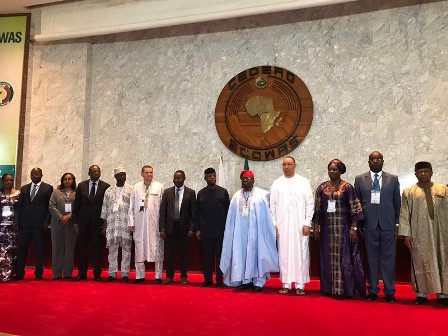Osinbajo calls for unified approach in tackling ECOWAS health crisis
-
Decries language, other barriers

ABUJA – Acting President, Prof. ‘Yemi Osinbajo has appealed to West African regional group, the Economic Community for West African States (ECOWAS), to work towards addressing health challenges confronting member nations uniformly for effective and sustainable results.
He said such was one of the objectives of the founding fathers of the body, but that language barrier, differences in policies, systems and procedures had been major impediments to attainment of ECOWAS goals.
Osinbajo made the call, Friday, while declaring open the 18th Assembly of Health Ministers of ECOWAS in Abuja. The week-long assembly, which came under the auspices of WAHO, was formally declared open by the Acting President.
Osinbajo said one of the arms of ECOWAS, the West African Health Organization, WAHO, is entrusted with the responsibility of coordinating and leading regional interventions on health programmes within the sub-region.
He said since it was launched, WAHO had continued to work assiduously and delivering on its mandate.
“The challenges are enormous; the vision of ECOWAS founding fathers to see a harmonized and unified response to the challenges of the sub-region continues to be a daunting one. This has been so as a result of differences in language, systems and procedures, among others.”
The Acting President noted that “with the population of about 355 million people of ECOWAS countries, the sub-region still battles diseases such as malaria, tuberculosis, tropical diseases and other newly-emerging diseases, the likes of Ebola and Lassa fever.”

He explained that the challenges combined had thrown up “challenges of immense proportion” to member nations of ECOWAS and WAHO itself, adding that access to health care remained a significant problem in the sub-region.
“The West African Health Organization through its strategic operations must put in more efforts towards reduction of communicable diseases in the sub-region, such as malaria, tuberculosis and HIV/AIDS.”
Osinbajo stated that while recent outbreak of Ebola virus disease in DRC raised concerns, member nations must actively take steps by putting in place preventive measures to avoid its spread to other parts of the sub-region.
Accrding to him, the West African countries were taken by surprise in 2014 when the disease broke out “with colossal loss of lives,” adding that they should avoid a repeat.
“The establishment of the regional Centre for Disease Control is therefore an excellent idea in building capacity and ensuring effective surveillance, prevention and management of disease outbreak,” he said.
The Acting President promised that Nigeria would support the centre and ensure its smooth take-off. He also urged WAHO to explore the use of technology in upscaling the health of people of the sub-region.
He emphasized the need for harmonization and unified actions by WAHO for member states and well-planned actions, backed by the use of technology and opportunities provided by mobile telephony saying these would bridge the gaps of time that has been lost in the past years.
Meanwhile, Osinbajo congratulated African community on the election of first African to head the World Health Organization.
”This shows that Africa has all that it takes to be entrusted with the responsibility of health care of the people of the world,” he added.
In his address, Minister of Health, Prof. Isaac Adewole, said health should no longer be seen as a resource-consuming sector, but a sector that contributes to economic development of every nation.
He explained that in contributing to economic development, West Africa nations, and indeed the continent, should improve access to quality health care without allowing “catastrophic” spending.
“Similarly, we need to strengthen our health system to deliver high impact interventions. Our focus at reducing the burden of diseases of our people should be unequivocal. This meeting holds to set out priorities to address the shortage of human resources through task shifting. Nigeria has already adopted a task shifting policy.
“It is no news that we struggled over the years with communicable diseases, but we are beginning to experience the high burden of non-communicable diseases (NCDs) such as cancers, hypertension and diabetes amongst others.
“Unfortunately, there is paucity of data to inform our interventions. We must invest in collection of data to inform decision making and implement feasible and evidence-based control programmes for these NCDs at the country and regional levels,” he added.
The minister however harped on concerted effort by WAHO to combat tobacco menace. He said nations in the sub-region should not be deceived by the economic gains of producing and selling tobacco and its products.He argued that adverse health consequences of smoking far outweigh the economic benefits.
“We need to unite within the region to effectively control sale of cigarette to under-aged, ban its use in public places and enforce implementation of appropriate sanctions in order to promote the health of our people.
“Using surveillance data, we must plan ahead to control seasonal outbreaks of infectious diseases peculiar to our sub region. The Regional-CDC is well positioned to take off and address regional public health emergencies and Nigeria will be providing infrastructural support for the Regional –CDC.
“Nigeria’s involvement in WAHO activities and leadership responsibilities is not commensurate with her strategic position and resource mobilization. In this regard, I wish to appeal to member states to reciprocate the commitments of the Government of Nigeria in ECOWAS by ceding more leadership roles to qualified Nigerians within WAHO.”

